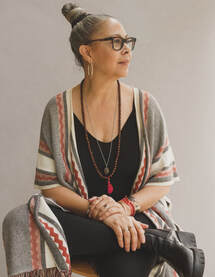|
“No matter how revolutionary the practice of Yoga is, it is not helpful if we continue to limit certain folks from participating.”
While many have been contemplating the arrival of spring, I have been contemplating privilege and oppression; especially in the context of Yoga. I view these concepts much like Purusha (pure consciousness) and Prakriti (matter, or that which is created), in that they can be examined separately, but they are inextricably linked together. In this same way, privilege and oppression are dubious neighbours - opposites which work in lockstep with each other. I am specifically interested in exploring gatekeeping (more on this in a moment) and accessibility to Yoga and spiritual communities – you know, who’s invited to the party, but more importantly, who’s not. How easy is it for black, indigenous, and people of colour (BIPOC) to attend classes, do teacher trainings, or attend conferences? Who is it that is allowing this access? If we choose to undertake this mission, then, when we consider privilege, we are also compelled to examine oppression, and all the ways in which we do, and especially do not, invite participation into these spaces. Those of us who have dedicated ourselves to practicing and teaching Yoga know the profound power it possesses. Yoga assists with the simple (or, often, not so simple) ability to lean into the discomfort of the human condition. Yoga and Yogic philosophy can teach us how to make friends with life at the very least and, at best, help us to transcend our suffering and experience liberation. If we follow just the simple instruction of paying attention to the breath, of following the inhalation and exhalation, then we can come to understand how the air that enters our body is transformed by some alchemical process into prana (life force.) With the magic of grace, our internal world and mind are softened; even transformed. And perhaps we, for just a few minutes, are free. We learn over time that the freedom found within these simple practices can be revolutionary. But no matter how revolutionary the practice of Yoga is, it is not helpful if we continue to limit certain folks from participating. I wholeheartedly believe in the importance and the responsibility of maintaining a formal seated and physical Yoga practice. I am equally interested in how I can live Yoga “off the mat,” and how I can educate others to do the same. At the heart of this practice is the exploration of right alignment between oneself and society (the Yamas): developing the skills to be able to honour someone else’s experience and acknowledging how we each play a pivotal role with one another. For me, nothing exemplifies this more accurately than the following poem by the Buddhist monk Thich Nhat Hahn: You are me, and I am you. Isn’t it obvious that we “inter-are”? You cultivate the flower in yourself, so that I will be beautiful. I transform the garbage in myself, so that you will not have to suffer. I support you; you support me. I am in this world to offer you peace; you are in this world to bring me joy. We may consider right alignment between oneself and society as “refining” ourselves, by polishing our own rough edges and applying the practices defined in the Yamas of non-harming, truthfulness, non-possessiveness, non-hoarding, and the right use of energy. And slowly but surely, we come to realize how our individual actions impact the other. So, I am inviting us to recognize that there are some folks who continue to be excluded from these practices, because of a little something called “gatekeeping.” If you are unfamiliar with the term “gatekeeping,” allow me to share a couple of definitions with you:
Simply put, gatekeepers assess who is "in or out." (Wikipedia) We often see gatekeepers as people who hold legitimate or sanctioned power, like a president, a judge, or a doctor. However, we all guard different gates to greater or lesser degrees. We guard gates overtly and we guard gates unconsciously. “We are all micro gatekeepers” (Michelle Johnson). In our daily life we gate-keep in many ways and I want to be clear it is not all bad. In fact, often is very necessary. For example, I guard a variety of gates for my elderly mother, ensuring her well-being financially, medically, and sometimes emotionally. If you have young children, you may guard gates by limiting access to electronic devices by controlling what is watched and for how long. But gatekeeping can also become problematic. For instance, when we micromanage someone’s work product or constantly criticize the way our partner parents the children or looks after the pets. What are some of the positive and/or negative ways that gatekeeping shows up in your life? We also see gatekeepers in spiritual communities. Spiritual gatekeepers may be self-appointed and/or in positions of leadership that determine:
It must be noted that in the examples above such as costing classes, etc. does need to be done and is not inherently bad. But we do need to look at how it is being done, who it is inviting in and who it is excluding. Perhaps even more problematic, spiritual gatekeepers may take it upon themselves to set arbitrary standards that define what devotion looks like, who is devoted, and more concerning, who is not. This type of gatekeeping has the stench of spiritual superiority. Baba Hari Dass, wrote, “As soon as a person starts thinking, 'I want to be a better person,' that is the start of Yoga.” For me this statement is so inclusive and welcoming. It leaves it up to the individual to be their own gatekeeper and determine what being a “better person” means and therefore what devotion might look like for them rather than it being decided by an external authority. Do not misunderstand me. I believe in the importance of healthy boundaries. They create safety and respect between self and others and individuals and organizations. A gate can be a legitimate boundary that needs to be respected. There is a place for gatekeeping in Yoga practices for instance. Take the methods of pranayama (breathing techniques). It is important that students be prepared physiologically with beginning breathing techniques prior to moving on to intermediate practices, under the guidance of a qualified teacher. The same can be said for Yoga Teacher Training curriculum. It is important that it be taught in an organized manner, that it can be clearly understood and digested, so the student is being afforded the best learning outcomes. We have an invitation here to be transparent about positions of power and leadership in spiritual communities. Let us keep reflecting on how folks in these positions often become the gatekeepers of this revolutionary path to freedom, and that this can have a very real and damaging impact on the ability of another to access this path, or to become part of a Yogic or other spiritual community. Finally, I will leave you with three questions that I was left with during a recent workshop:
We have a responsibility to one another. The philosophical teachings of Yoga as set out in Yamas are all about relationship with self and society and so, at their core, they are also about social justice. My deep prayer is for those of us who have been fortunate enough to walk through an open gate, keep it propped open for those behind us, who have not been given such easy access. Because, as Fannie Lou Hamer, a women’s rights activist during the civil rights movement beautifully put it, “nobody’s free until everybody's free.”
4 Comments
Joanne Pasta
4/5/2021 08:23:48 pm
Gatekeeping ... such a complex ball of yarn to unravel. Thanks for sharing your musings as your thoughts prompts me to think about who has opened the gates for me and who has kept them closed. How have I helped keep a gate closed whether knowingly or unknowingly? Sadly, systemic injustice exists. I can only hope that through learning, discussing and acknowledging, I can become better. 🙏🏽
Reply
Chetna
4/6/2021 08:16:35 am
Thank you for taking the time to read Joanne. Yes, gatekeeping is complex for sure. We all do it and we've all had it done to us. My hope is that folks will continue to consider this when their actions affect someone else's access to something. Ommm and love xx
Reply
Tanya Gita Roberts
4/13/2021 05:36:33 pm
Thank you for embracing vulnerability and sharing your musings. You are a gifted writer. I feel like your heart and soul are on the page in your words. You write in a way that is relatable and accessible - you show how to bring high level concepts into real life. Please keep sharing your musings!!!!!
Reply
Chetna
4/13/2021 07:29:37 pm
Thanks Gita for taking the time to read and reflect. I'm deeply grateful that you find some benefit in my musings and that this moves you to action. Ommm and love pal <3
Reply
Your comment will be posted after it is approved.
Leave a Reply. |
Hello, beautiful people. My name is Tracy Chetna Boyd (she/her). Among other things, I am a Yoga educator and Yoga Therapist, with a special interest in Yoga for Cancer. Although I have many teachers, my primary teacher is Baba Hari Dass. I have a deep belief in people’s ability to change, forgiveness, redemption, and the teachings, wherever they come from. Small talk has never been my forte. I am a person who is comfortable living in the weeds of the human condition, while keeping my heart open and the big picture in perspective. I hope this sets the tone for the musings I'll be sharing from time-to-time. Archives
April 2024
Categories
All
|





 RSS Feed
RSS Feed
